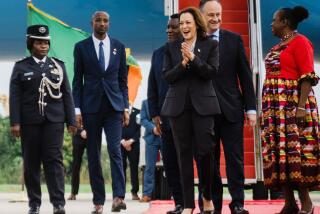Albright Wraps Up Trip to Africa
- Share via
HARARE, Zimbabwe — Winding up a week’s tour of Africa, Secretary of State Madeleine Albright said Monday that Washington’s traditional foreign policy emphasis on human rights must be adjusted to take into account the “local context” of the continent’s diverse countries.
This was a rare admission by a top U.S. official that the American model of multi-party democracy, freedom of association and respect for opposition opinion may not be exportable to the Third World.
Still, Albright talked about human rights at every stop of her seven-nation tour. She also seemed to make few converts. And she left little doubt that the U.S. does have concerns in Africa that go beyond democracy and human rights.
Her visit was only the second by a secretary of State to sub-Saharan Africa in the post-Cold War era. Secretary of State Warren Christopher toured the continent 14 months ago, near the end of his four-year tenure. Albright stressed that she traveled to Africa in her first year of office to dramatize its importance to Washington. At every stop, she asserted that she intends to come back before leaving the State Department.
“Clearly, human rights and the rule of law have to continue to be central in the bedrock of our relationships, but we have to understand the local context,” Albright said. “We make a mistake if we think every African country is the same and that we can just organize the way we think everything ought to be done.
“We have to realize the difference in these countries and the various evolutions they are going through and it is only appropriate that the United States, while pressing our agenda, respect the agendas in these countries,” she said, standing beside Zimbabwean President Robert Mugabe, leader of a de facto single-party state that last week was marked by a bloody riot blamed by local human rights groups on the police.
Albright’s joint news conference with Mugabe demonstrated the sensitivity of the Zimbabwean leader to foreign criticism of his regime’s human rights performance. When a U.S. reporter asked about last week’s incidents, in which police beat demonstrators despite a court order not to interfere with the protests, Mugabe snapped: “I don’t know what he is referring to as suppressive measures.”
He described the demonstrators as hooligans and looters, adding that every government has an obligation to maintain law and order.
Mugabe’s comment echoed an outburst last week by Congolese President Laurent Kabila, also in a news conference with Albright.
Asked about the arrest and beating of an opposition political leader, Kabila said: “Do you call a ‘politician’ those who come off the street to incite people to kill each other, to divide people, who will manufacture political pamphlets in foreign embassies with the intent of dividing people--do you call that a ‘political leader’? Do you leave people like that free on the street?” Kabila ended with a sardonic “Long live democracy.”
Although Mugabe and Kabila reacted similarly to suggestions of government repression, they are poles apart on Washington’s political agenda. Mugabe’s government has ruled his country, once the British-ruled Southern Rhodesia, since its legal independence in 1980. Mugabe--now serving as president of the Organization of African Unity--is entrenched in Harare, the capital, despite growing street protests against some of his policies. The United States clearly can affect matters in Zimbabwe only at the margins. And U.S. officials admit privately that the country is not so strategic that its fate would have a major effect on American policy.
By contrast, Kabila and his allies seized power this year in what was once Zaire, ousting longtime dictator Mobutu Sese Seko. The Congo regime is inexperienced and untested in governing. But it controls one of the continent’s biggest countries, a nation that has a profound effect on its neighbors.
Albright and her aides made it clear that they hope to influence Congo. “There is reason to be encouraged that with constructive interaction on our part,” one senior U.S. official said, “with a little bit of coaching and hand holding, there may be some room for progress.”
Albright carefully picked her itinerary, visiting African countries that, for the most part, have exhibited economic potential and have adopted at least the trappings of democracy.
Zimbabwe, for instance, has an untrammeled press that often criticizes the government. The Financial Gazette here reported extensively on last week’s protests, quoting local human rights groups sharply critical of the police.
“Just on the day when Zimbabwean police were teargassing and whipping up anyone trying to move into Harare city center on Tuesday, it was appropriately announced that police officials from the Democratic Republic of Congo were in the Zimbabwean capital to learn how to bring peace and stability to their troubled . . . nation,” the paper said wryly.
Nigeria and Kenya are among the continent’s important powers, but their recent human rights performance has been so abysmal that they could not qualify for a visit.
More to Read
Sign up for Essential California
The most important California stories and recommendations in your inbox every morning.
You may occasionally receive promotional content from the Los Angeles Times.










